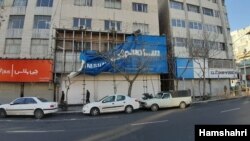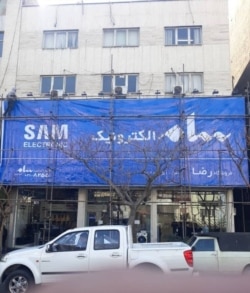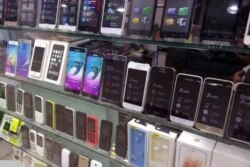U.S. sanctions on Iran appear to have forced two South Korean consumer electronics makers to retreat from the Iranian market, further isolating Tehran from what used to be a major Asian trading partner.
For years, Samsung and LG have been the dominant providers of home appliances and mobile phones to Iranian consumers.
But in recent weeks, advertising banners for the two companies have been taken down from several home appliance stores in the Iranian capital, Tehran, according to photos and reports published by Iranian and Asian news sites.
The reports said the advertising banners had been or would be replaced by banners featuring the brands of the two South Korean companies’ respective Iranian partners.
In the case of Samsung, a February 13 article by Iran’s state-approved Hamshahri newspaper showed photos of a Samsung storefront banner in Tehran being replaced by one for Sam Group’s “Sam Electronic” brand.
In LG’s case, a February 21 report by Japan’s Nikkei news site said its correspondent found that an LG banner had been removed several days earlier from another Tehran storefront. The report said the banner soon would be replaced by an advert for Gplus, a brand made by Goldiran Co.
Reports by Hamshahri, Nikkei and South Korea’s Yonhap news agency cited Iranian shop workers and manufacturing industry representatives as saying that in recent months, Samsung and LG had stopped supplying parts and products to their Iranian partner companies for domestic assembly and distribution. They said the changes in advertising banners reflected plans by Sam Group and Goldiran to boost the profile of their domestically-produced brands for Iranian consumers.
The reports attributed the downgrade of Samsung and LG cooperation with their Iranian partners to U.S. sanctions against Iran’s financial system.
Galaxy app store (Android app store for Samsung phone) won't let Iranians to purchase apps from Feb 25th. @SamsungIR can you explain why? Is this related to #sanctions?
— AmiR Rashidi (@Ammir) January 20, 2020
Apparently, @cafebazaar is going to be the only Android app store in Iran & simply this means less security. pic.twitter.com/DzyCfjCxlE
In another move reflecting a reduction of business activity in Iran, Samsung began sending messages to Iranian users of its mobile phones last month, saying they no longer will be able to buy apps from its Galaxy store beginning February 25.
“Over time, it has become increasingly difficult for Samsung and LG to operate in Iran due to U.S. restrictions on financial transactions with Iranian banks,” said Troy Stangarone, senior director of the Washington-based Korea Economic Institute, in a VOA Persian interview.
“Iran has been cut off from the SWIFT network, meaning it is difficult for Samsung and LG to continue to operate in Iran from a financial perspective,” he added.
The Belgium-based Society for Worldwide Interbank Financial Telecommunication (SWIFT) is a messaging system that connects more than 11,000 financial institutions around the world. It began disconnecting Iranian banks in November 2018, as the U.S. sanctioned those banks and threatened penalties against SWIFT for allowing sanctioned banks to keep using the network.
Samsung and LG did not respond to VOA Persian emails seeking comment on the role of U.S. sanctions in their scaling back of operations in Iran.
Hamshahri and a journalist for Iran’s state-approved Financial Tribune newspaper reported earlier this month that they had received a Samsung statement citing problems the company has experienced with financial transactions in Iran.
LG Electronics senior director Ken Hong told Nikkei that the company was still “very much involved” in the Iranian market despite the “changing of some LG signage to Iranian brands.”
Iranian officials reacted angrily to the downgrades of activity by Samsung and LG, accusing them of giving in to American bullying and warning that returning to the Iranian market will be difficult.
In comments reported Tuesday, Mohammad Jafar Nanakar, head of legal affairs at Iran’s Information Technology Organization (ITO), called on Samsung to scrap its planned cut-off in Galaxy store app sales or face penalties including a ban on its staff entering the country.
The latest moves by Samsung and LG in Iran are unlikely to significantly harm their overall financial performance in the short term, Stangarone said.
“Samsung’s profit largely comes from semiconductors, its most profitable division. Its smartphone division also is profitable, but Iran likely provided a small proportion of that profitability,” he said. “Much of Samsung’s smartphone sales to Iranians probably were mid-to-lower level models, as with LG.”
Stangarone said the loss of market dominance in a country of 80 million people could prove more costly to the South Korean companies in the long run, if and when U.S. sanctions are lifted and middle class incomes rise in tandem with Iran’s wealth.
“In a post-sanctions period, I think this depends on a couple of factors,” he said. “One is, how loyal Iranians customers will be toward the Samsung and LG brands. Another is, whether there will be any new competition from China’s Huawei or other companies that entered the market in the interim.”
South Korea saw its trade with Iran shrink significantly last year, when it complied with U.S. sanctions prohibiting all purchases of Iranian oil exports after May 2019. Seoul previously had been one of the main Asian buyers of Iranian crude, before replacing it largely with crude from the U.S., according to a recent Reuters report.
Korea Customs Service data show South Korea’s imports from Iran almost halved to $2.1 billion last year from $4.1 billion in 2018. They also show South Korea’s exports to Iran plunged even more precipitously to $282 million from $2.3 billion in the same period.
"Bilateral trade was largely, in terms of Iranian exports to South Korea, energy-based. But (Samsung & LG exports to Iran) helped to diversify the overall trade picture into consumer goods, and I think the severing of that relationship is where the significance is here,” Stangarone said.
This article originated in VOA’s Persian Service.













